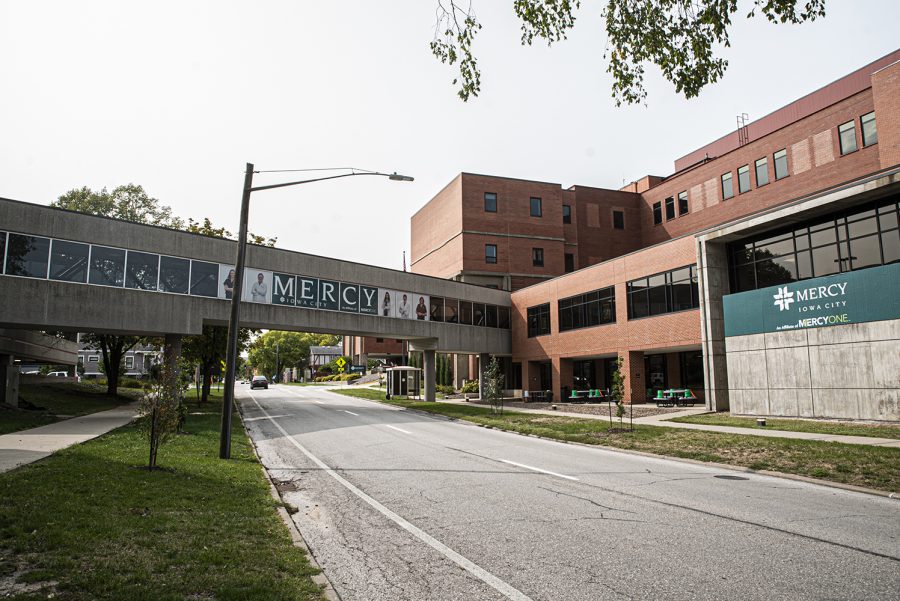Opinion | Mercy Hospital’s inpatient closure will harm the most vulnerable Iowans
People suffering from mental-health issues will oftentimes require significant assistance that can’t be done with outpatient care — closing inpatient care will only harm them.
Mercy Hospital is seen in Iowa City on Monday, September 15th, 2020. (Tate Hildyard/ The Daily Iowan)
October 12, 2020
A year ago, my piece about Iowa investing more in mental health ran. Recent events support the argument that the Hawkeye State is still the worst in the country at treating mental illness.
Iowa City’s Mercy Hospital is closing inpatient care due to financial problems and most patients needing outpatient care.
Getting rid completely of inpatient care takes away a resource many patients with mental health issues need. People who are suicidal, aggressive, threatening, using subrances, or experiencing psychosis need inpatient care for stabilization.
Even if inpatient care isn’t the most needed service, there are people in Iowa City who need it. Where are they going to once Mercy closes it? The Cedar Rapids Gazette reported University of Iowa Hospital and Clinics are overwhelmed with psychiatric patients.
This is not surprising considering current circumstances. Quarantine and pandemics take a toll on mental health. People with pre-existing mental health conditions respond more strongly to the stress and crisis.
Iowans also faced a natural disaster. There was an increase of people seeking services from mental health experts after Derecho. It is possible what happened in August exacerbated symptoms of people with pre-existing mental illnesses.
Mercy wants to deny Iowans a mental health service they need now more than ever.
I understand hospitals are a business, all of which are struggling right now. However, saving money should not prevent patients with the most severe mental health issues from receiving the help they need. People not being able to receive inpatient care can cost them and others their lives.
Being denied inpatient care can worsen symptons. Suicide attempts are highly associated with untreated mental health disorders. This is not surprising. It’s not unreasonable to assume being denied inpatient care can increase feelings of hopelessness and the sense of nobody caring about you in people with depression.
I am aware patients in that situation can utilize outpatient care services still at Mercy. However, since inpatient care is more critical care, it can lead to them not receiving treatment to the extent they need. Eating disorders are a good example of someone with a mental illness needing more than a therapist.
If the life of someone with anorexia is in danger, they need treatment in a hospital emergency room for heart rhythm disturbances, dehydration, electrolyte imbalances, and consistent refusal to eat. Inpatient hospitalization provides them with structure, medical care, monitoring, and support they would not have had in outpatient care.
If Mercy really is struggling financially and feels outpatient care is a more needed service, a better plan of action would have been cutting funding for and decreasing inpatient care instead of completely getting rid of it.
From the perspective of an average citizen scrolling through headlines of local media, it seems like they overlooked how negatively this decision will impact their patients with the most severe psychiatric problems means they don’t care much about them.
Mercy will lose patients and revenue from this decision. Psychiatric patients needing inpatient care are not going to come to Mercy if that service is not available. They also will not pay Mercy for treating them. Does this solution even benefit the hospital financially?
There are already enough barriers to people who need it receiving mental health services, such as cost and stigma. Hospitals should decrease, instead of increase, that difficulty. Fixing this problem, and Iowa’s mental health crisis, is not easy — but it’s even harder to suffer needlessly.
Columns reflect the opinions of the authors and are not necessarily those of the Editorial Board, The Daily Iowan, or other organizations in which the author may be involved.
















